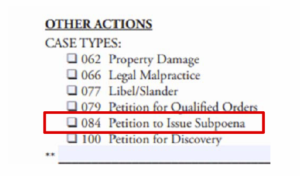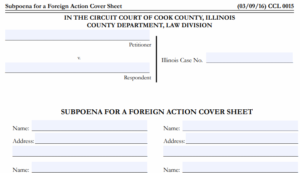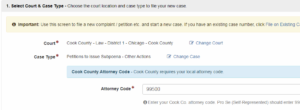An important part of being an attorney is creating and sending subpoenas correctly and efficiently, which takes practice. When done right, a subpoena requires a person or company to (a) testify at a trial, hearing, or deposition, (b) to allow an inspection of a place, and/or (c) to produce or copy documents or electronically stored information. For attorneys that don’t practice in Illinois, this article explains how you can get your subpoena issued from out-of-state. Assuming that you only want to obtain information or documents from a company in Cook County, we will expand that county’s procedures for forms and how to eFile in a way that makes the process quick and painless.
The Uniform Interstate Depositions and Discovery Act (“UIDDA”) (735 ILC 35/1 et. seq.) is the law determining interstate subpoena procedure. Most states have enacted this law except Wyoming, Missouri, Oklahoma, Texas, New Hampshire, and Massachusetts. The Uniform Law Commission’s website will provide any updated information.
This law allows an attorney from another UIDDA state to send their subpoena to, in our case, the Cook County Clerk of Court. The Clerk will then issue an Illinois version of the subpoena which the out-of-state attorney will serve in accordance with Illinois rules.
These are the documents that need to be filed in Cook County’s Law Division:
These forms could potentially change so check the court’s website to ensure you are using the most up-to-date forms.
In Cook County, new matters always require the Civil Action Cover Sheet to be eFiled. Also, remember to check the box for Petition to Issue Subpoena under the Other Actions section.

Under section 3(c)(B) of the UIDDA, the names, addresses, and telephone numbers of all counsel of record and any party not represented by counsel must be listed and submitted using the form Subpoena for a Foreign Action Cover Sheet.

In order to prepare an Illinois subpoena for each document custodian, the subpoena must have identical case names, captions, addresses, and phone numbers of both parties and attorneys. The subpoenas must also identify the same document custodian and contain the same provisions and content of the requested information. The Illinois subpoena receives an Illinois case number once eFiled.

Once your documents are prepared, you must eFile them using an eFiling Service Provider like CourtFiling.net. Combine all your different documents including your Civil Action Cover Sheet, Subpoena for a Foreign Action Cover Sheet, and out-of-state subpoena into one PDF file.
To avoid potential rejection, make your fillable forms uneditable. With fillable forms, the contents could be wiped so the court clerk would only see blank entries, resulting in a rejection. It is also useful to make sure your forms are OCRd or made searchable.
Begin eFiling as you would any new case. If you’re using CourtFiling.net, select Cook County-Law-District 1-Chicago-Cook County as the Court and Petitions to Issue Subpoena-Other Actions as the Case Type in the Select Court & Case Type section. Then enter your attorney code. If you’re filing outside of Cook County, you can select a different court and case type. Attorneys with no Cook County attorney code can enter 99500.

Ad Damnum is the damages or claim amount that you are suing for in your out-of-state action. Since it is a required field, you will need to fill in an Ad Damnum amount. For Cook County’s Law Division specifically, they will hear cases with a claim amount of $30,000 or more.
You will add the PDF with your Civil Action Cover Sheet, Subpoena for a Foreign Action Cover Sheet, and out-of-state subpoena in the “Add Documents” section. Select the document type as Complaint – Petitions To Issue Subpoena – Fee. Be aware of any filing fees in the county. Cook County has a filing fee on $388.00. Using Exhibits File as the Document Type, upload the Illinois subpoena.
You’ll receive the file-stamped copies once the clerk accepts your filing, just make sure that the Illinois subpoena is issued by observing the clerk’s seal.
Once all the steps outlined above have been completed, you must serve your Illinois subpoena. You can either hire a process server or serve via certified mail. See Ill.Sup.Ct.Rule 204(a)(2) for more information.
As always with eFiling in Illinois, processes and procedures can change at any time and without notice, so please give yourself plenty of time to eFile. Contact Law Division management at (312) 603-5426 with any questions.
Share This Post
Support ArticlesFind answers in our extensive directory of help articles. |
|
Live ChatOur most popular support option. Connect with us right away. |
|
(801) 448-7268Call us Monday through Friday between the hours of 7:00 AM to 7:00 PM PST. |